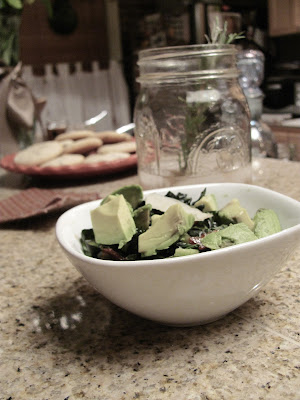December's book club was quite fun. We met at Kayla's to discuss Ready Player One, to eat delicious food, and to exchange gifts. In fact, it was pretty much a perfect night until we left the house.
Kayla made a mushroom gruyere tart, kale salad, and rosemary chocolate chip shortbread. To drink, she mixed rosemary infused vodka with pear juice, blackberry Izzie, and soda water. Let me just say, it was really, really good. This drink needs a name. Ideas? We listened to a Ready Player One playlist full of fun eighties music- thanks, Kara!
Video Discussions:
And here's a written summary of our discussion (in case you are too busy for videos):
SPOILER ALERT!! Do not read on unless you're okay with spoilers.
Only two of us finished Ready Player One in its entirety. It wasn't the book itself that kept us from completing it; it was the craziness of the holiday season and the length of the book. I actually sped through to the end the day after book club. Ready Player One is a lot of fun. It's replete with references to Eighties pop culture and geek culture. We knew we were missing a lot of the allusions, but what we caught added both playfulness and the depth to the read. It's also an adventure story above all else and full of excitement and suspense as a result. Ready Player One is set in 2044, and environmental destruction has depleted the earth's resources and made life almost unbearable. Just as the earth was falling apart, a programming genius named Halliday invented a virtual reality called Oasis in which almost all humans now live, work, and play. Before he died, Halliday hid the rights to his vast fortune within the game. He created three keys and three gates, and the last leads to his billions. A 19-year-old boy named Wade with a tragic life is the first person to discover the copper key, which propels him into an intense race to complete the quest before an evil corporation or other "egg hunters" do. Besides being entertaining, the book hints at a lot of very interesting questions about the nature of reality, both in terms of physical versus virtual realities and the reality of the past versus our memories of it. Some of us thought that the author could have explored these issues a little more deeply. For instance, how did it really affect the people in that society to live almost entirely online? Were their prisoners of their own making, or did someone or something entrap them in this virtual world? Or contrarily, is a virtual reality stigmatized but really no worse than the "real" world? Along those lines, we all liked that the author wasn't heavy handed with his criticisms of Oasis and in fact pointed out some positives of it.
Here is one of my favorite paragraphs from the book, which takes place as Wade is walking through a recreation of Halliday's childhood home within Oasis: "Looking around, I wondered why Halliday, who always claimed to have had a miserable childhood, had later become so nostalgic for it. I knew that if and when I finally escaped from the stacks, I'd never look back. And I definitely wouldn't create a detailed simulation of the place." I liked it because it reminded me of the nostagia the book has for the Eighties and gets at that weird disconnect between the reality of the past and our memories of it and how we can never relive the reality of the past. As Courtney pointed out, it's also connected to the idea of how a physical world differs from a virtual reality. A virtual world, like a dream or a memory, is better than the real thing in a lot of ways because we have more control over it and we can make it what we want it to be, but, maybe contradictorily, you can't affect a whole lot of change on a fake world.
-Bess








No comments:
Post a Comment
hey! thanks for commenting.
Note: Only a member of this blog may post a comment.